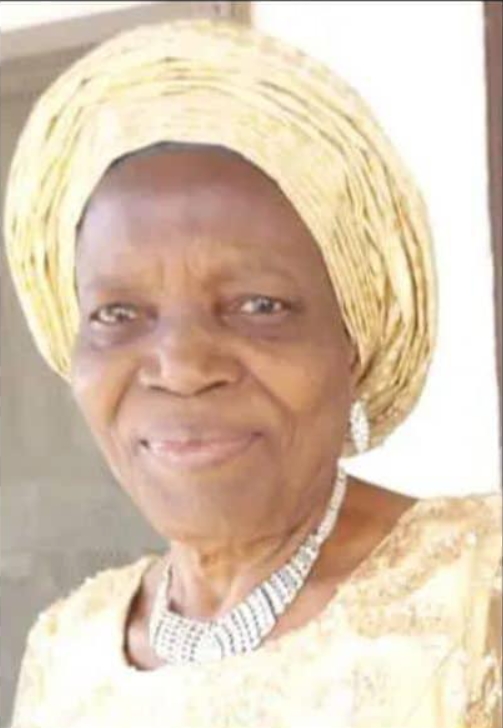Maritime Agencies
SPEEDY TRIAL OF CASES: Stakeholders At MASPAN/AMANO Summit Caution NDLEA, Other Agencies.
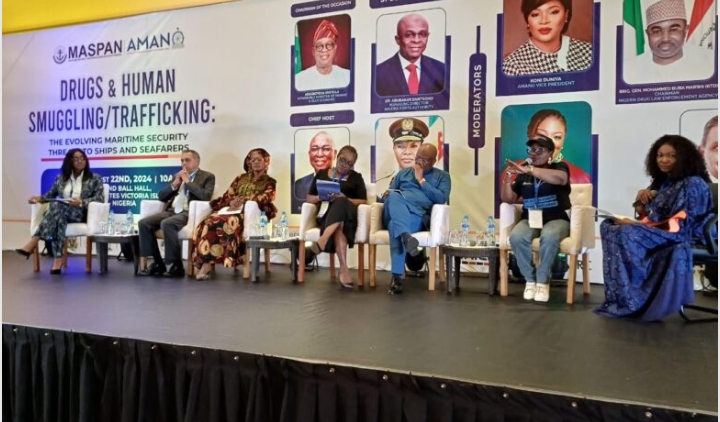
By Izuchukwu Ozoemena
The National Drug Law Enforcement Agency (NDLEA) and similar regulatory bodies have been asked to change their investigative tactics, speed up and desist from unduly dragging investigations into cases of drugs found on vessels. Delay, it is argued, places at a huge disadvantage ship crew, shipowners and importers aboard vessels suspected to carry drugs and other illicit substances especially when, at the end of the day, they are found not culpable for such transactions.
Interventions by shipping experts unanimously pointed this way in Lagos,Thursday, when shipping and security stakeholders converged at the Maritime Security Providers Association of Nigeria (MASPAN) and Alumni of Maritime Academy of Nigeria Oron (AMANO) summit to discuss “Drugs & Human Smuggling/Trafficking: The Evolving Maritime Security Threats To Ships Seafarers”.
They observed that shipowners lose millions of dollars to vessel delays, legal costs, crew salaries and inconveniences including additional costs on their families during delayed investigation of drug trafficking suspicions.
Several shipowners, the experts observed, have gone into depression and bankruptcy as they battle loss of business opportunities and other inconveniences.
Speaking at the event, Capt Suresh Prabhakar, Director, Operations, Pacific Basin Shipping Ltd, Hong Kong, deplored a situation where the regulatory agencies would detain ships for a long period of time, spend months on investigation only to discover later that the crew, shipowners and even importers do not have a hand in the transactions.
“From February 2021 to July 2024,” he pointed out, “there were 4 bulk carriers laden with sugar from Santos, Brazil, to Lagos where cocaine of quantities varying from 18 to 43 kilograms were discovered onboard each ship by the NDLEA.”
“During the course of the investigations, each ship was delayed for between 4 to 6 months and allowed to sail after owners posted bonds ranging from $2 million to $5 million.”
“On each ship about half the crew members, which is about 10 crew per ship, were detained. The bail amount posted per crew member to allow them to reside in a hotel rather than in a detention facility was $40,000, which totals to $400,000 for 10 crew.
“On two ships, after multiple court hearings crew were released after being detained for about 20 months each. The other two ships’ crew are still under detention in Lagos whilst court hearings are ongoing. The crew have been in Lagos for 34 months and 13 months respectively.
“Such incidents cost ship owners huge amounts of money in lost revenue by way of vessel delays, legal costs, crew salaries, family upkeep and the like. Additionally, when crew members are subjected to such treatment, most responsible owners expend a lot of time and effort in trying to secure their release.”
Cases such as these, he explained, place the shipowner at a disadvantage, adversely impacting his ability to engage in such trades and maintaining business on productive routes.
Prabhakar asked regulatory agencies to be proactive always. Shipowners should be informed when it is proved that the crew aboard a ship are involved in the drug trafficking. He maintained that the shipowners would be ready and willing to hand over the suspects to the authorities, rather than detain the ship indefinitely with other innocent crew members.
“But unfortunately in some countries like here (Nigeria), the NDLEA have been detaining ships for long periods of time, crews for long periods of time and then they have sort of been put through a lot of mental and physical stress. And then many of them don’t want to come back to sea again as a career” he regretted.
In his remarks, Chairman of the occasion, the Minister of Marine and Blue Economy, Gboyega Oyetola, condemned the current level of security threat in the maritime sector, particularly as concerns illicit drugs and human trafficking.
He spoke through Heaky Dimowo, the Director, Marine Environment Management, Nigerian Maritime Administration and Safety Agency, NIMASA.
“These activities are not merely criminal act, they erode our social fabric, destabilize communities and challenge our law enforcement at sea,” the Minister said.
“Moreover, they pose significant risk to the Maritime and Security of seafarers and vessels. Today we must confront the fact that our waters are increasingly viewed as transit route to illicit activities.”
The minister maintained that it was essential that Nigeria developed comprehensive strategies to address these evolving threats by leveraging on technical innovations, enhancing intelligence capabilities and fostering collaboration among critical stakeholders.
“Together, we can develop multifaceted responses that effectively combat these challenges” he concluded.
“On each ship about half the crew members, which is about 10 crew per ship were detained. The bail amount posted per crew member to allow them to reside in a hotel rather than in a detention facility was $40,000, which totals to $400,000 for 10 crew.
“On two ships, after multiple court hearings crew were released after being detained for about 20 months each. The other two ships’ crew are still under detention in Lagos whilst court hearings are ongoing. The crew have been in Lagos for 34 months and 13 months respectively.
“Such incidents cost ship owners huge amounts of money in lost revenue by way of vessel delays, legal costs, crew salaries, family upkeep and the like. Additionally, when crew members are subjected to such treatment, most responsible owners expend a lot of time and effort in trying to secure their release.”
He said cases such as these, adversely impact the ability of shipowners to engage in such trades and several owners and operators are forced to choose alternative trade routes.
Prabhakar appealed to relevant agencies of government, especially the NDLEA to always inform the shipowners once they are sure that the crew are involved in the drug trafficking incident. He maintained that the shipowners would be ready and willing to hand over the suspects to the authories, rather than have the ship detained with other innocent crew members detained, insisting that in 99.99% of the cases there is zero crew members involved.
“But unfortunately in some countries like here, the NDLEA have been detaining ships for long periods of time, crews for long periods of time and then they have sort of been put through a lot of mental and physical stress. And then many of them don’t want to come back to sea again as a career” he disclosed.
Speaking, the Summit Chairman, Emmanuel Maiguwa said the United Nations Office on Drugs and Crime
(UNODC) sees West Africa as a transit region for narcotics mostly emanating from South America, a development that gave filip to the summit.
“With recent incidents involving merchant ships (excluding cases of drugs concealed in cargo containers) from South America to Nigeria rising to about four within the last two years, this maritime corridor proves to be providing mobility for this illicit activity.
He informed that on the issue of human trafficking, records from Africa Risk Compliance (ARC) show a significant number of incidents where stowaways have been discovered on ships calling Nigerian ports.
While Nigeria may not present specific records linking stowaways to drug smuggling operations, he continued, it is of great concern that drug traffickers could potentially collaborate with stowaway networks. This partnership could lead to a coordinated effort to use stowaways as couriers, moving drugs from West Africa to Europe.
“Both MASPAN and AMANO express strong support for the fight against all forms of trafficking and smuggling, including drugs and humans; we are mainly focused on addressing responses to these crimes as they occur within the maritime corridor.
“We aim to ensure that perpetrators of these crimes are apprehended and fully punished by the law without subjecting the innocent to unnecessary difficulties that are counterproductive to the growth of shipping” he added.
Maritime Agencies
NAGAFF Pledges Watertight Enforcement, Unveils A More Formidable 100% Compliance Team.
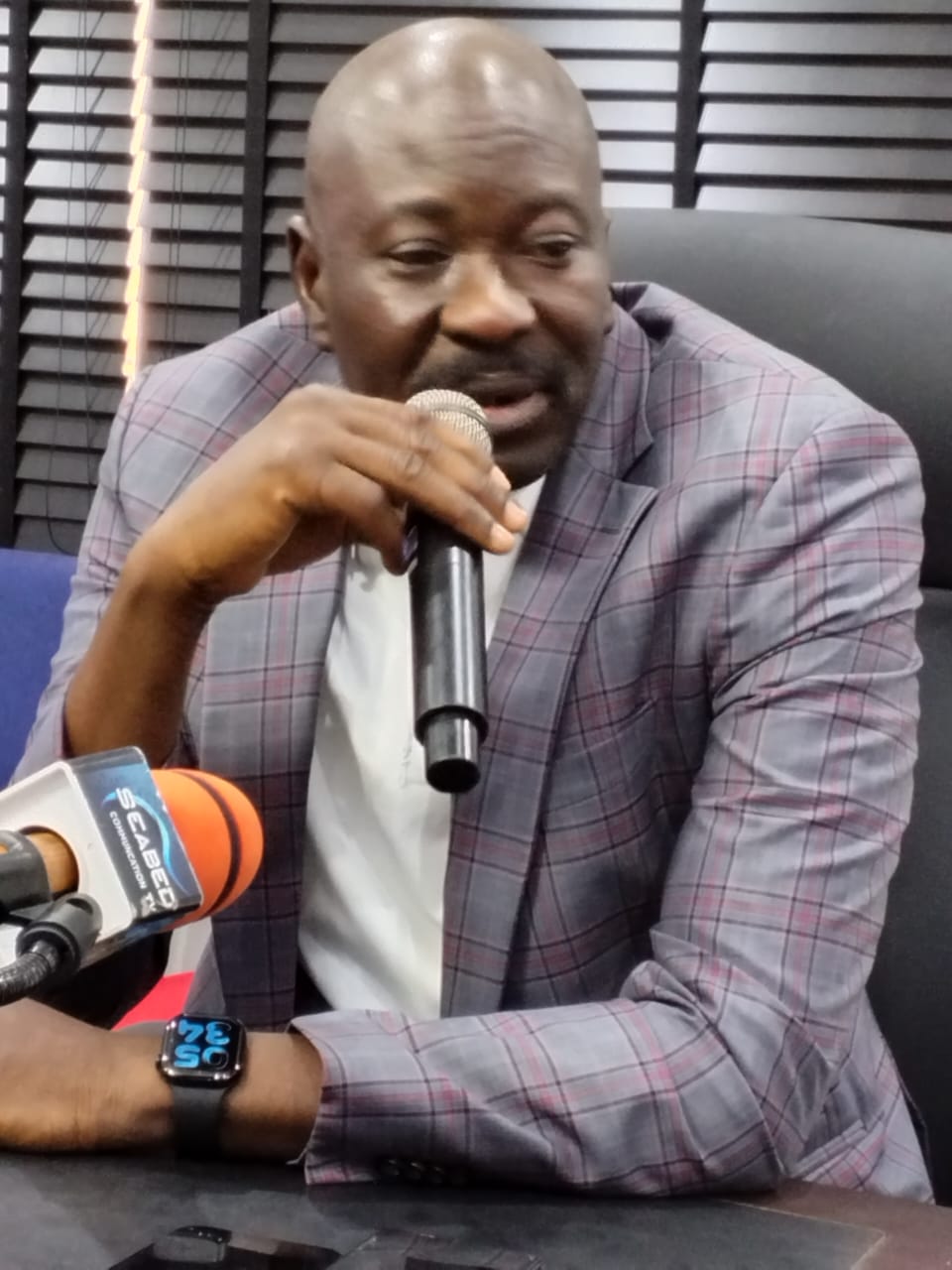
By Izuchukwu Ozoemena
The 100% Compliance Team of the National Association of Government Approved Freight Forwarders (NAGAFF) which appeared inactive for over six months is now reformed and better focused to perform her duties strictly in line with her mandate.
The Team Coordinator, Alhaji Ibrahim Tanko, disclosed this in Lagos, Friday, during the official unveiling of a new office complex at Eleganza Plaza, Apapa.
“Today, we commission the new secretariat of the 100% Compliance Team and we are ready to take this Team to a higher pedestal”.
He said that for over six months, the interventionist outfit went into some kind of hibernation to take a comprehensive review of internal issues especially concerning her operations and the overall conduct of her operatives with a view to performing better.
”From today”, he pledged, “you will start seeing the effects of a new Compliance
Team”.
On stakeholder concerns that some operatives of the Team do not live above board in their conduct even as it is said that he who goes for equity must come with clean hands, Tanko said among every twelve, there must be a Judas.
On the question of discipline, every society is made up of the good, the bad and the ugly, he posited
”We are doing everything possible to sanitise the system and to continue to maintain discipline”.
Tanko who promised that the Team is now ready to build into the training programme of the NAGAFF Academy said as part of the rebirth now unveiled, Customs Area Commands are now to support regular refresher courses for freight forwarders especially in the aspect of classification. He assured that going forward, the Team’s programmes and activities are to benefit from full digitalization.
He announced that the Team is set to acquire a new office in Port Harcourt which it plans to open come February. “We are working hand- in-hand with the Economic and financial Crimes Commission (EFCC) and the Independent Anti-Corruption Practices Commission (ICPC) to make Nigeria stronger. We shall also expand this new place to accommodate the TDI that will also hopefully open in February.”
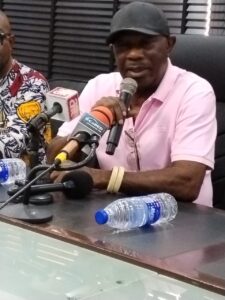
Dr Boniface Aniebomam, NAGAFF Founder
Earlier in his post-inauguration remarks, NAGAFF Founder, Dr Boniface Okechukwu Aniebonam extolled the willingness of NAGAFF leaders to add value, describing it as the driving force behind the association. Those running the Compliance Team, he cautioned, must understand the limit of their position. “The saying ‘See something, say something’ is very observatory.”
” Do note that the Port is a Customs Port. If Customs has not released your cargo, do not make trouble until it is done; if it is released on the ground of expediency, also remember that other sister agencies are also there to intervene. The NAGAFF approach is centred on dialogue, communication, diplomacy and discussion.
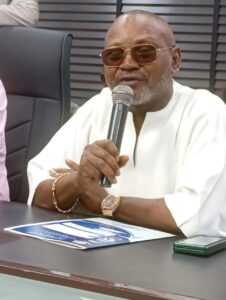
Chief Tochukwu Ezisi, NAGAFF National President
NAGAFF President, Chief Tochukwu Ezisi recalled that when the NAGAFF 100% Compliance Team was inaugurated four years ago, the industry was at crossroads. There were compliance gaps, procedural inconsistencies even as operational shortcuts worked against efficiency and operational trust.
”Many wondered whether a single team could truly shift the culture of an entire industry.”
He said with the birth of the Compliance Team, the level of regulatory compliance among freight forwarders nationwide went up while infractions, delays, penalties and operational setbacks took the back seat.
He explained that strengthened collaboration with key government agencies, especially the
Nigeria Customs Service, promoted ethical conduct and professionalism and has contributed significantly to improved revenue assurance for the Federal
Government.
The Compliance Team has equally enhanced the reputation of NAGAFF as a responsible, forward-thinking, and compliance-driven organization.
Chief Ezisi set ambitious targets for the repositioned NAGAFF 100% Compliance Team to include full Digital Compliance Integration as the goal is to become the most digitally-compliant freight forwarding body in Nigeria.
The group is also out to reduce compliance infractions by 60% within two years through training, monitoring and proactive engagement even as institutional collaboration is enhanced.
”We must deepen our partnership with Customs, NPA, SON, NAFDAC, and other regulators to promote transparency, fairness, and predictability in port operations.
NAGAFF will also establish a National Compliance Intelligence Network to help detect detect risks early, identify patterns of malpractice, and protect members from avoidable pitfalls.
Customs
PTML Customs Hands Over Seized Arms and Ammunition, Collects N44.06bn in January.
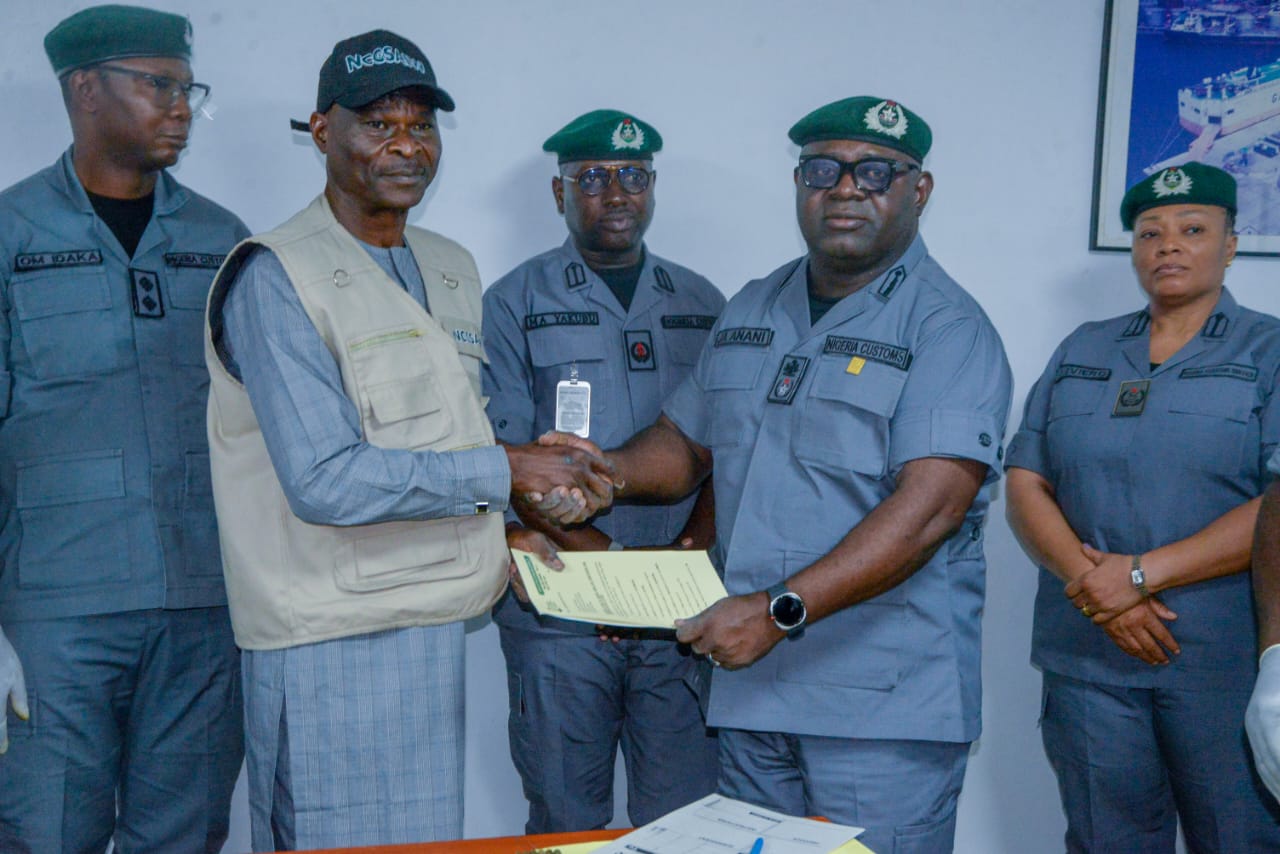
By Izuchukwu Ozoemena
For the umpteenth time, the Ports Terminal Multi-services Limited (PTML) Command of the Nigeria Customs Service has made it clear that it remains a no-go area for unlawful trade under any guise.
As a Command, the PTML Customs has an unshaken commitment to implement the Revised Kyoto Convention, which is a World Customs Organisation (WCO) instrument for trade facilitation while using available manpower and technology to exercise the required control for import and export trade.
The Customs Area Controller, Comptroller Joe Anani stated this at the Command Headquarters in Apapa, Friday, while handing-over seized arms and ammunition to the National Centre for the Control of Small Arms and Light Weapons (NCCSALW).
The seizures consist of five (5) pistols of different makes, one (1) Crossman pump master rifle, 132 Remington live cartridges, 51 9 mm Lugar live ammunition and four (4) 9mm magazines.
Others were forty (40) 9mm, NIM FC 30-30 blank and hollow ammunition and one hundred and eighteen (118) of 9mm empty shells.
”These arms and ammunition were uncovered in 25 different occasions by our officers during the examination of imported vehicles between 2022 to 2025.”
”These seizures are a fallout of the collective due diligence of the Command and other sister agencies in the port.”
The handing-over, he explained, follows the approval of the Comptroller General of Customs, Bashir Adewale Adeniyi, MFR psc(+).
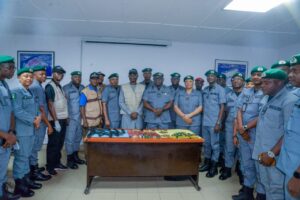
Present at the event was the South- West Coordinator, National Center for the Control of Small Arms and Light Weapons (NCCSALW) and his entourage. Others were the Management of Port and Terminal Multi-services Limited, sectional heads and heads of other sister agencies.
He explained that under the NCS Modernisation Project which was pioneered by the PTML Command, the Unified Customs Management System (UCMS), also known as B’Odogwu, has raised the bar for productivity.
”I am pleased to announce that this Command will receive scanners soon as part of the modernisation project and our capacity to detect concealments, like these arms and ammunition would be greatly enhanced.”
Appreciating the Command’s compliant stakeholders for their cooperation at all times, he described them as l part of the Command’s success story.
The CAC announced that two days to the end of January, 2026, the PTML Command collected a total revenue of ₦44,058,849,416.65. This figure surpasses N40,497,594,223.89 realized in January, 2025 by N3,561,255,192.76, marking an 8.8% increase in revenue.
On behalf of the CGC, Comptroller Joe Anani formally handed over the seizures to the National Center for the Control of Small Arms and Light Weapons (NCCSALW) for appropriate action.
Maritime Agencies
WAR AGAINST KILLER DRUGS: Apapa Customs, NDLEA Collaborate To Nab Huge Quantity of ‘Canadian Loud’.
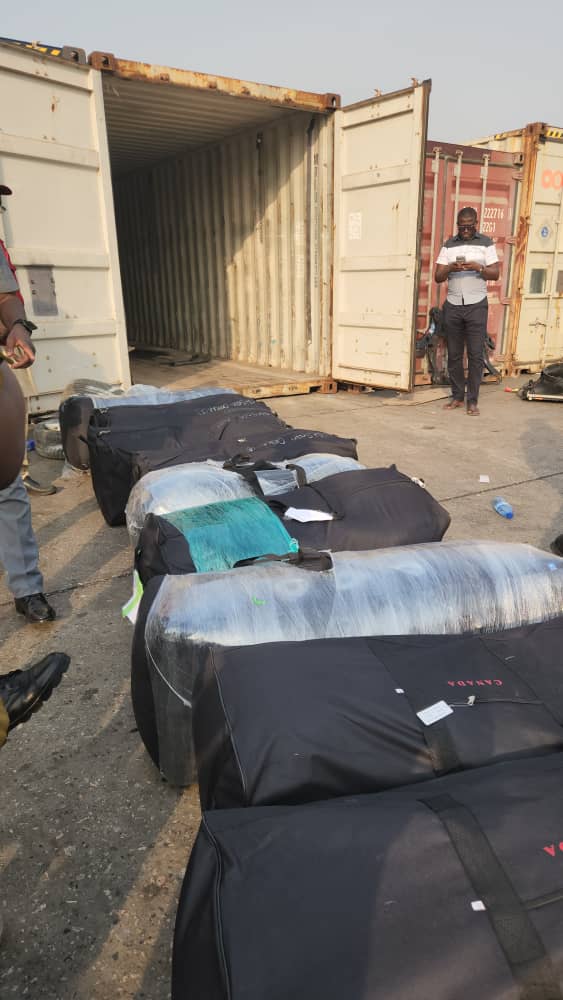
By Izuchukwu Ozoemena
In her unwavering efforts to ensure that killer – drugs do not find entry into Nigeria, the Apapa Command of the Nigeria Customs Service has, in liaison with the National Drug Law Enforcement Agency (NDLEA), intercepted a 347.5 kilograms of ‘Canadian Loud’ concealed in an imported Toyota Sienna car. The highly – valued substance is a potent strain of cannabis, ordinarily known as marijuana.
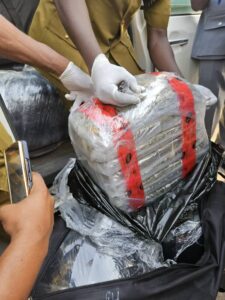
As stated in a press release by CSC Isah Suleiman, the Apapa Customs Command Public Relations Officer, the contraband hidden in 13 bags within one of four vehicles contained in a single consignment was discovered following a painstaking weighing exercise. A breakdown shows ten bags at 25kg each, one at 29kg, and two at 34.5kg and 34kg respectively, totaling 347.5kg.
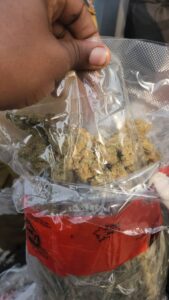
This interception marks the fourth major joint drug bust by the Nigeria Customs, Apapa Command and the NDLEA in less than two months.
In his remarks, the Apapa Customs Area Controller, Comptroller Emmanuel Oshoba re-enacted his warning to criminal elements and their networks to keep off the Command as the Command is always ahead of them to exploit whatever antics they deploy to undermine national security via the ports.
“Any attempt by criminal elements to traffic prohibited items through Apapa Port will be detected and thwarted. We remain vigilant and resolute in the discharge of our duty to protect our society and national security.”
He emphasized that under his watch, no cargo, whether import or export will pass through Apapa Port without thorough examination.
The operation also reflects the exemplary cooperation between Customs and NDLEA, championed by the Comptroller General of Customs, Bashir Adewale Adeniyi MFR, PhD. Intelligence sharing and joint tactical efforts have consistently outmaneuvered smuggling networks in Nigeria’s maritime sector.
Oshoba credited this strengthened partnership for the success, noting that the upcoming deployment of a high-capacity drive-through scanner capable of processing 200 containers per hour will further revolutionize anti-smuggling operations.
Both agencies continue to operate under strict Standard Operating Procedures (SOPs) that foster zero tolerance, professionalism, and seamless cooperation. In line with established protocols, the seized cannabis has been formally handed over to the NDLEA for further investigation and prosecution of suspects linked to the consignment.
This latest success builds on the recognition accorded to Comptroller Oshoba and NDLEA Apapa Special Area Commander Mohammed Tukur, who were both awarded the WCO Certificate of Merit on January 26, 2026, in Abuja during the International Customs Day celebrations.
Oshoba further explained that the interception aligns with the 2026 ICD theme: “Customs Protecting Society Through Vigilance and Commitment.”
While Customs remains committed to facilitating legitimate trade, the CAC reaffirmed, it will intensify efforts to disrupt illicit activities and safeguard society.
-
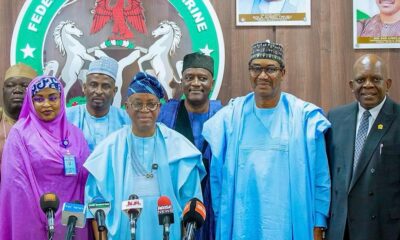
 Customs2 weeks ago
Customs2 weeks agoFG Inaugurates Nigerian Shippers’ Council Board, Highlights Need for Reduced Port Costs, Fair Pricing.
-
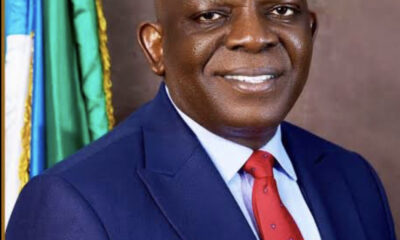
 Maritime Agencies2 weeks ago
Maritime Agencies2 weeks agoSuspend Charges Review, Engage Stakeholders, Shippers’ Council Tasks Shipping Companies
-
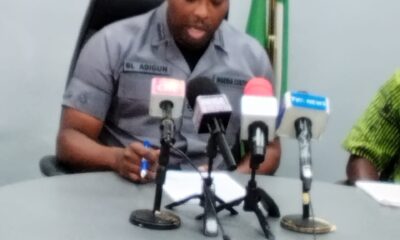
 Customs1 week ago
Customs1 week agoKLT Customs Surpasses 2025 Revenue Target By a Wide Margin, Clamps Down on Expired Imports.
-
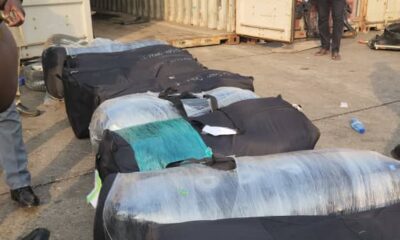
 Maritime Agencies6 days ago
Maritime Agencies6 days agoWAR AGAINST KILLER DRUGS: Apapa Customs, NDLEA Collaborate To Nab Huge Quantity of ‘Canadian Loud’.
-

 Maritime Agencies1 week ago
Maritime Agencies1 week agoOGUN AREA 1 CUSTOMS: Suspected Armed Drug Traffickers Mount Barricades, Attack Officers. Two Personnel Critically Injured.
-
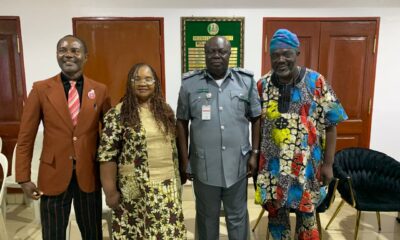
 Maritime Agencies1 week ago
Maritime Agencies1 week agoSeme Customs Raids Hideouts, Impounds 200 Bags of Smuggled Rice, Collects N2bn 3 Weeks into 2026.
-

 Customs1 week ago
Customs1 week agoLekki Deepsea Port: The Success Story of the Nigerian Ports Authority.
-
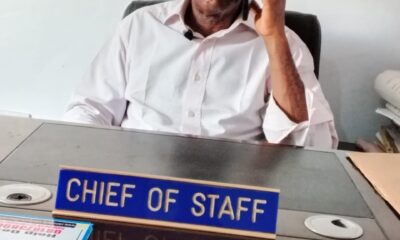
 Maritime Agencies6 days ago
Maritime Agencies6 days agoNAGAFF Compliance Team Set to Relaunch for Stronger Engagement, Enforcement.

























